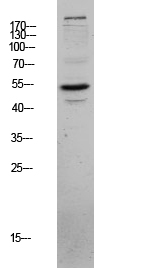CLUS Polyclonal Antibody
- Catalog No.:YT6146
- Applications:WB;ELISA
- Reactivity:Human;Mouse;Rat
- Target:
- CLUS
- Fields:
- >>Complement and coagulation cascades
- Gene Name:
- CLU APOJ CLI KUB1 AAG4
- Protein Name:
- Clusterin (Aging-associated gene 4 protein) (Apolipoprotein J) (Apo-J) (Complement cytolysis inhibitor) (CLI) (Complement-associated protein SP-40,40) (Ku70-binding protein 1) (NA1/NA2) (Testosterone-
- Human Gene Id:
- 1191
- Human Swiss Prot No:
- P10909
- Mouse Gene Id:
- 12759
- Mouse Swiss Prot No:
- Q06890
- Rat Gene Id:
- 24854
- Rat Swiss Prot No:
- P05371
- Immunogen:
- Synthesized peptide derived from human CLUS Polyclonal
- Specificity:
- This antibody detects endogenous levels of CLUS.
- Formulation:
- Liquid in PBS containing 50% glycerol, 0.5% BSA and 0.02% sodium azide.
- Source:
- Polyclonal, Rabbit,IgG
- Dilution:
- WB 1:500-2000, ELISA 1:10000-20000
- Purification:
- The antibody was affinity-purified from rabbit antiserum by affinity-chromatography using epitope-specific immunogen.
- Concentration:
- 1 mg/ml
- Storage Stability:
- -15°C to -25°C/1 year(Do not lower than -25°C)
- Other Name:
- Clusterin (Aging-associated gene 4 protein) (Apolipoprotein J) (Apo-J) (Complement cytolysis inhibitor) (CLI) (Complement-associated protein SP-40,40) (Ku70-binding protein 1) (NA1/NA2) (Testosterone-repressed prostate message 2) (TRPM-2) [Cleaved into: Clusterin beta chain (ApoJalpha) (Complement cytolysis inhibitor a chain);Clusterin alpha chain (ApoJbeta) (Complement cytolysis inhibitor b chain)]
- Observed Band(KD):
- 52kD
- Background:
- The protein encoded by this gene is a secreted chaperone that can under some stress conditions also be found in the cell cytosol. It has been suggested to be involved in several basic biological events such as cell death, tumor progression, and neurodegenerative disorders. Alternate splicing results in both coding and non-coding variants.[provided by RefSeq, May 2011],
- Function:
- function:Not yet clear. It is known to be expressed in a variety of tissues and it seems to be able to bind to cells, membranes and hydrophobic proteins. It has been associated with programmed cell death (apoptosis).,similarity:Belongs to the clusterin family.,subunit:Antiparallel disulfide-linked heterodimer. Interacts with APOA1, CLUAP1 AND PON1.,
- Subcellular Location:
- [Isoform 1]: Secreted . Can retrotranslocate from the secretory compartments to the cytosol upon cellular stress. .; [Isoform 4]: Cytoplasm . Keeps cytoplasmic localization in stressed and unstressed cell. .; [Isoform 6]: Cytoplasm . Keeps cytoplasmic localization in stressed and unstressed cell. .; Nucleus . Cytoplasm . Mitochondrion membrane; Peripheral membrane protein; Cytoplasmic side . Cytoplasm, cytosol . Microsome . Endoplasmic reticulum . Mitochondrion . Mitochondrion membrane . Cytoplasm, perinuclear region . Cytoplasmic vesicle, secretory vesicle, chromaffin granule . Secreted isoforms can retrotranslocate from the secretory compartments to the cytosol upon cellular stress (PubMed:17451556). Detected in perinuclear foci that may be aggresomes containing misfolded, ubiquitinated
- Expression:
- Detected in blood plasma, cerebrospinal fluid, milk, seminal plasma and colon mucosa. Detected in the germinal center of colon lymphoid nodules and in colon parasympathetic ganglia of the Auerbach plexus (at protein level). Ubiquitous. Detected in brain, testis, ovary, liver and pancreas, and at lower levels in kidney, heart, spleen and lung.
- June 19-2018
- WESTERN IMMUNOBLOTTING PROTOCOL
- June 19-2018
- IMMUNOHISTOCHEMISTRY-PARAFFIN PROTOCOL
- June 19-2018
- IMMUNOFLUORESCENCE PROTOCOL
- September 08-2020
- FLOW-CYTOMEYRT-PROTOCOL
- May 20-2022
- Cell-Based ELISA│解您多样本WB检测之困扰
- July 13-2018
- CELL-BASED-ELISA-PROTOCOL-FOR-ACETYL-PROTEIN
- July 13-2018
- CELL-BASED-ELISA-PROTOCOL-FOR-PHOSPHO-PROTEIN
- July 13-2018
- Antibody-FAQs
- Products Images

- Western blot analysis of MCF-7 lysate, antibody was diluted at 1000. Secondary antibody(catalog#:RS0002) was diluted at 1:20000



